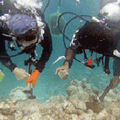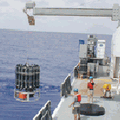 來自26個國家的150位海洋學者日前發出「摩納哥海洋酸化宣言」,對日益嚴重的海洋酸化提出警告,要求各國政府快速採取行動遏止溫室氣體排放,以降低漁業及珊瑚礁所受到的威脅。
來自26個國家的150位海洋學者日前發出「摩納哥海洋酸化宣言」,對日益嚴重的海洋酸化提出警告,要求各國政府快速採取行動遏止溫室氣體排放,以降低漁業及珊瑚礁所受到的威脅。
該宣言指稱,若大氣中的二氧化碳含量持續增加,到了2050年,海洋酸化將使多數海域變成不適宜珊瑚生存的環境。珊瑚生態的崩壞可能導致商業漁獲承受巨變、威脅數百萬人的糧食安全以及數千億元的漁業。
這波宣言於1月31日召開的一場研討會上發表,當天摩納哥親王艾伯特二世(Prince Albert II)呼籲,今年底將在哥本哈根召開聯合國氣候變遷大會,全球政治領袖在與會之前務必關照此一宣言的內容。該研討會由摩納哥親王帶領的環境基金會贊助,親王表示:「我強力贊同此宣言,也希望到年底會議時,所有的政治領袖都已聽聞過此宣言。」
摩納哥也是聯合國國際原子能總署「海洋環境實驗所」的所在處,該實驗所成員、研討會主席奧爾(James Orr)表示,問題確實存在,「差別只在於糟糕的程度,以及發生時間快慢而已。」
目前國際研究社群已發展出一套結合船隻、浮標和衛星的全球海洋碳含量觀察系統,以瞭解海洋如何吸收大氣中的二氧化碳
海洋吸收了1/4人類活動排放到大氣的二氧化碳,過去25五年來調查發現,海洋表面酸度與大氣中的二氧化碳濃度關係呈現正比。
國際地生圈研究計劃(International Geosphere-Biosphere Programme,IGBP)執行長、研討會贊助者之一的塞特辛格教授(Sybil Seitzinger)指出,「據摩納哥宣言上海洋專家所言,我們清楚地瞭解海洋正快速酸化,凸顯出紀錄海洋生物相關改變的重要性。」 
據最新氣候發展模型預測未來十萬年後情形,丹麥團隊警告,假使不深度追查全球暖化現象,海洋死亡區域(dead zones)繼續擴增的因素將難以確定下來。
地球系統科學團隊丹麥中心領導人,與來自丹麥氣象局、國家太空局的科學好手一同研究的哥本哈根大學教授雪佛(Gary Shaffer)表示:「死區的擴張將使魚群以及貝類環境更為嚴苛,增加暴斃事件產生,例如美國西岸大陸的奧瑞岡以及智利。」
雪佛解釋:「假使真如那些氣象模擬所示,那麼海洋的轉向循環(overturning circulation)將因溫室效應而逐漸減弱,而這些溶氧極小區也將更為擴張,入侵更深海域。」
Immediate government action to halt greenhouse gas emissions is needed to limit damage to fisheries and coral reefs due to increasing ocean acidity, warned more than 150 marine scientists from 26 countries in a declaration issued today.
Ocean acidification may make most regions of the ocean inhospitable to coral reefs by 2050, if atmospheric CO2 levels continue to increase, the declaration warns.
This reef collapse could lead to substantial changes in commercial fish stocks, threatening food security for millions of people as well as the multi-billion dollar fishing industry.
Prince Albert II of Monaco today urged political leaders to take notice of the declaration ahead of negotiations at the UN Climate Change Conference in Copenhagen at the end of the year.
"I strongly support this declaration," said the prince, whose environmental foundation provided support for the symposium. "I hope the declaration will be heard by all the political leaders meeting in Copenhagen in December 2009."
"The questions are now how bad will it be and how soon will it happen," said symposium chair James Orr of the Monaco-based UN Marine Environment Laboratories, a division of the the International Atomic Energy Agency.
The international community has been developing a global observing system for ocean carbon, using ships, buoys, and satellites to understand how the ocean absorbs atmospheric CO2.
The ocean absorbs a quarter of the carbon dioxide emitted into the atmosphere from human activities. Observations from the last 25 years show increasing acidity in surface seawater, following trends in increasing atmospheric CO2.
"The Monaco Declaration is a clear statement from this expert group of marine scientists that ocean acidification is happening fast and highlights the critical importance of documenting associated changes to marine life," says Professor Sybil Seitzinger, executive director of the International Geosphere-Biosphere Programme, one of the sponsors of the symposium.
Dead zones across the world's oceans would expand by a factor of 10 or more if global warming continues unchecked, the Danish team warned, based on newly developed climate models that project 100,000 years into the future.
"Such expansion would lead to increased frequency and severity of fish and shellfish mortality events, for example off the west coasts of the continents like off Oregon and Chile," said Professor Gary Shaffer of the University of Copenhagen, leader of the research team at the Danish Center for Earth System Science, with scientists from the Danish Meteorological Institute and the National Space Institute.
"If, as in many climate model simulations, the overturning circulation of the ocean would greatly weaken in response to global warming," explained Shaffer, "these oxygen minimum zones would expand much more still and invade the deep ocean."



